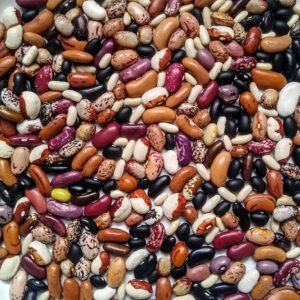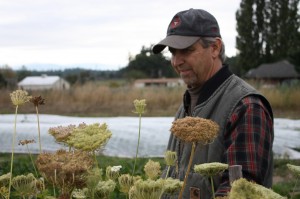
 OSA’s Dr. John Navazio recently talked to the New York Times about heirloom seeds and our approach to breeding for organic farming systems. Check out the full piece here. Some snippets are below.
OSA’s Dr. John Navazio recently talked to the New York Times about heirloom seeds and our approach to breeding for organic farming systems. Check out the full piece here. Some snippets are below.
John Navazio, 56, a Washington State University seed specialist and senior scientist for the Organic Seed Alliance, suggests that the growers who developed heirloom seeds wouldn’t be content with them today.
“A 1902 cabbage by Burpee was a perfectly good cabbage by 1902 standards,” Dr. Navazio said. “But the truth of the matter is, none of our ancestors ever viewed these things as done. You never stopped breeding your livestock. You never stopped selecting your cabbage.”
In his career as a plant breeder, Dr. Navazio, of the Organic Seed Alliance, has actually created a new colored carrot. It’s open-pollinated (or O.P.) and goes by the name Purple Dragon, “which unfortunately sounds like a ‘Flintstones’ vitamin,” he said. (For more seed ideas, see the accompanying article.)
The great bank of heirloom seeds is ripe for fresh creations and practical improvements, Dr. Navazio said. “When people say that hybrids are better than the O.P.s, well, duh! You’ve been throwing all of your brainpower at developing hybrids for more than 30 years. And the nonhybrids, the O.P.s, have sat and languished with almost no one doing any good selection and genetic maintenance on them. At that point, it’s a self-fulfilling prophecy.”
His organization’s cause is not to romanticize old seeds, he said. Instead, this Washington-state nonprofit hopes to rebuild the regional farming culture that invented those cultivars. The place for such a movement to start, Dr. Navazio argues, is the small farm. And the people to do it are the farmers themselves.
Dr. Navazio points to Theresa, David and Dan Podoll, organic seed growers in Fullerton, N.D. Over the years, their family farm has gradually bred a Septoria leaf spot resistance into its Crimson Sprinter tomatoes. The immunity isn’t total, as it might be in a hybrid. But by selecting the hardiest survivors each season, the tomato plant evolves along with the blight.
Intrigued? The Podolls’s tomato seeds can now be bought at High Mowing Organic Seeds, in northern Vermont. (But beware of late blight, said Jodi Lew-Smith, the company’s director of research and production.)
High Mowing typifies a crop of small companies selling well-adapted seeds to the local market, Dr. Navazio said. Similarly, Johnny’s and Fedco have become popular seed sellers in New England and the Northeast. Gardeners in the Pacific Northwest can buy from Uprising Seeds and Siskiyou Seeds.
As Siskiyou announces on the front page of its Web site, “Our vision is to connect seed growers, gardeners and farmers in a mutually beneficial relationship to support small-scale agriculture with superior genetics selected for the Pacific Northwest.”
Put another way, Siskiyou isn’t dealing in nostalgia. What it pledges to sell is a better seed.
